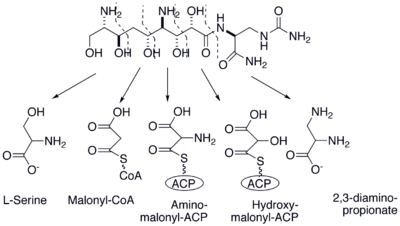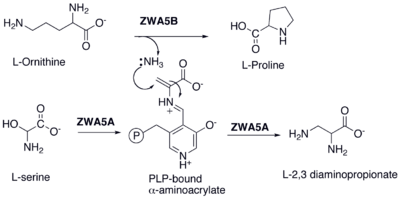Zwittermicin A
| Zwittermicin A | |
|---|---|
 | |
| IUPAC name 4,8-diamino-N-[1-amino-3-(carbamoylamino)-1-oxopropan-2-yl]- 2,3,5,7,9-pentahydroxynonanamide | |
| Identifiers | |
| CAS number | 155547-95-8 |
| ChemSpider | 24669086 |
| Jmol-3D images | {{#if:C([C@H]([C@H](CO)N)O)[C@H]([C@H]([C@H]([C@@H](C(=O)N[C@@H](CNC(=O)N)C(=O)N)O)O)N)O|Image 1 |
| |
| |
| Properties | |
| Molecular formula | C13H28N6O8 |
| Molar mass | 396.396820 |
| Except where noted otherwise, data are given for materials in their standard state (at 25 °C (77 °F), 100 kPa) | |
| Infobox references | |
Zwittermicin A is an antibiotic that has been identified from the bacterium Bacillus cereus UW85.[1] It is a molecule of interest to agricultural industry because it has the potential to suppress plant disease due to its broad spectrum activity against certain gram positive and gram negative eukaryotic micro-organisms. The molecule is also of interest from a metabolic perspective because it represents a new structural class of antibiotic and suggests a crossover between polyketide and non-ribosomal peptide biosynthetic pathways. Zwittermicin A is linear aminopolyol.[2]
Biosynthesis
Zwittermycin A biosynthesis is a hybrid of polyketide and non-ribosomal peptide synthetic pathways. Most likely, all of the synthases are located on one megasynthase much like a type I ketosynthase. Based on mutant studies, the biosynthetic cluster involved in zwittermicin production have been identified and the pathway proposed. The genes responsible for the production of zwittermicin A are located on a 16 kb cluster containing nine orfs and a self resistant gene zmaR, a gene that encodes an acylation enzyme that deactivate zwittermicin A.[3] The hybrid synthase used in zwittermicin A production utilizes modified extender units such as hydroxymalonyl-ACP, aminomalonyl-ACP and 2,3 diamino propionate. Therefore, many of the genes in the biosynthetic cluster encode for enzymes responsible for the synthesis of these extender units used in the hybrid synthase. For example, orf5 encodes ZWA5A, an enzyme that is responsible for the PLP mediated amination that converts L-serine to 2,3 diaminopropionate. It has also been shown that orf5, orf7, orf4 and orf6 participate in the biosynthesis of aminomalonyl-ACP and orf3, orf2 and orf1 synthesize hydroxymalonyl-ACP.[4]



Gene organization of the Zwittermicin A biosynthetic cluster.
Genes encoding for the seven component hybrid synthase responsible for the assembly of the backbone is likely located on the largest gene, orf8. Assembly begins by the activation of a serine residue. This is done by tethering the amino acid to a peptidal carrier protein via a non-ribosomal peptide synthetase. Subsequently elongation of an activated malonyl unit covalently attached to an acyl carrier protein by a ketosynthase occurs giving the five carbon unit. The next two elongation steps proceed in a similar manner using aminomalonyl and hydroxymalonyl units from a second and third ketosynthase. Finally, condensation of 2,3-diaminopropionate with the carried molecule by a second nonribosomalpeptide synthase produces the zwittermicin A backbone. Attack of ammonia via an amidotransferase enzyme releases the carrier protein. The last step involves a carbomyltransferase enzyme that carbamolates the released molecule giving the final product.[5]

Footnotes
- ↑ Haiyin, He (April, 1994) "Zwittermicin A, an Antifungal and Plant Protection Agent from Bacillus cereus", Tetrahedron Letters 35 (16) 2499-2502 doi=10.1016/S0040-4039(00)77154-1
- ↑ Rogers EW, Molinski TF (February 2007). "Asymmetric synthesis of diastereomeric diaminoheptanetetraols. A proposal for the configuration of (+)-zwittermicin a". Org. Lett. 9 (3): 437–40. doi:10.1021/ol062804a. PMC 2729442. PMID 17249781.
- ↑ Stohl EA, Milner JL, Handelsman J (September 1999). "Zwittermicin A biosynthetic cluster". Gene 237 (2): 403–11. doi:10.1016/S0378-1119(99)00315-7. PMID 10521664.
- ↑ Zhao C, Luo Y, Song C, et al. (April 2007). "Identification of three Zwittermicin A biosynthesis-related genes from Bacillus thuringiensis subsp. kurstaki strain YBT-1520". Arch. Microbiol. 187 (4): 313–9. doi:10.1007/s00203-006-0196-3. PMID 17225146.
- ↑ Emmert EA, Klimowicz AK, Thomas MG, Handelsman J (January 2004). "Genetics of zwittermicin a production by Bacillus cereus". Appl. Environ. Microbiol. 70 (1): 104–13. doi:10.1128/AEM.70.1.104-113.2004. PMC 321298. PMID 14711631.